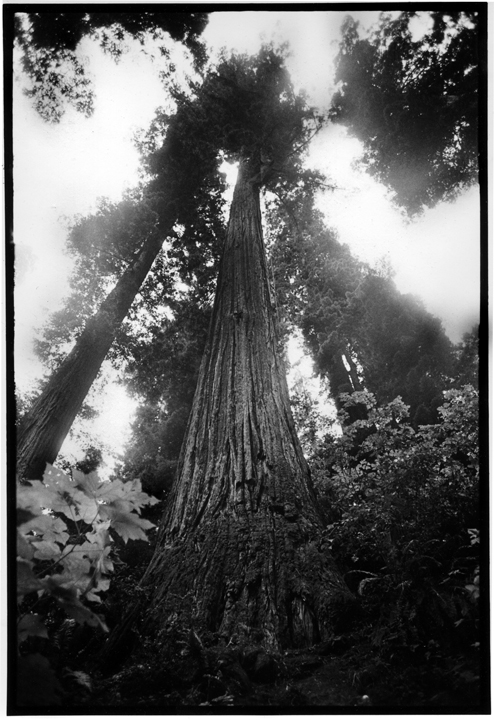Super Heroes!
Jeff Muskrat | 17.01.2008 20:55 | Climate Chaos | Ecology

Spooner! is a 297 foot tall Coast Redwood located in Scotia, Ca USA
It is dangerous simply to be on the ground during high winds in the woods, especially in forests surrounded by clear-cuts. Normally, the winds would be buffered by surrounding trees, acting as a wind shield, and protecting the inner woods. However, Nanning Creek and Fern Gully lack the protection that a normal, "healthy" forest has due to excessive logging.
The first time that I sat in a tree was in Nanning Creek, during a massive winter storm a few years ago. It was challenging enough to climb 160 feet to "Spooner's" lower living space in the rain and wind for my first experience. As the storm progressed the first night, I found my self clinging to the platform ropes for dear life as I watched surrounding trees sway back a forth in the winds. I wondered if I could make it through without giving up and climbing down.
The feeling is comparable to being in a very small "dingy" boat caught in a squall, only this "boat" was suspended high in a Ancient Redwood tree. As the storm progressed the second day and trees began to fall around us, I began to trust "Spooner" the tree and accept my situation. I chose to protect a being that was over two thousand years old and my place was to "go down with the ship" if by chance that this was "Spooner's" last storm.
Imagine, the storms that "Spooner" experienced these past two millennia. Spooner has seen earthquakes, floods, fires, and greater storms than we or our children will ever see, hopefully. This brought a sense of peace to me and helped reaffirm my presence. "Spooner" was never going to drop us. As I was thinking this, all of a sudden, my treemate and I hear a loud cracking and popping sound.
My first thought was that the "Sprout" that our platform is partially secured to was breaking off. "Sprout" is a branch, technically called a reiteration, but imagine this branch being about the size of a second growth tree, about 4-5 feet in diameter. “Sprouts” are known to fall from Coast Redwoods, part of Sequoia Semperviren’s reproduction cycle. I thought we were about to fall 160 feet, crashing to the forest floor below. My treemate helped keep me calm and collected as the sound got louder and closer.
BOOOOOOOOM! "Spooner" shook as if there was a large earthquake. My first thought was that we were safe but also I believed our tree "Spooner" was hit by another tree. Luckily, this was not the case. After inspecting the damage in the morning, we discovered that a large second growth tree had fallen over 500 feet away from "Spooner", on the edge of the grove and the clear-cut.
I am grateful to "Spooner", as well as the Universe, for protecting us through that wild and dangerous storm. We were in a place that even loggers refuse to enter during mild inclement weather, due to the danger of falling trees and "Widow Maker" branches. It takes spirit and dedication to protect these ancient giants. It takes faith and guts to stay in a swaying Redwood as trees fall around you. Anyone who treesits is definitely a hero, but choosing to risk your life in these fierce winds qualifies these brave activists as Super Heroes!
I am reminded of my "close to death" experience every time I visit Nanning Creek. The tree that fell so close, yet luckily so far to "Spooner", actually fell across our path into the Ancient Grove that we are protecting. The shoots of new growth reach for the sky and remind me that these life forms are precious and worth protecting. No matter how tired I am from hiking in supplies, or burned out from the psychological aspect of helping support a treesit, my heart is lightened and my spirits lifted every time I reach the end of my trek at the fallen one.
The fallen tree created a nice bridge for us to walk across on our way in, avoiding the mudslide and slash that Pacific Lumber is famous for, across our county. It is natural for Redwoods to fall, and for reiterations to break off, creating new trees. Redwoods reproduce that way. Redwoods seeds have only a .05 germination rate. Most redwood trees come from fallen trees, reiterations or stumps that are fortunate to have fallen naturally and left to grow or decompose. Clear-cuts are unnatural, and logging companies are forced to sometimes plant these destroyed areas, usually with cloned GMO trees.
If a tree falls in the woods, does it make a sound? Of course it does, especially for someone who is there risking their life to protect these Ancients. But there is both the physical sound of a tree snapping and crashing to the floor, and the metaphysical sound as the process of rebirth begins for a Coast Redwood. It is an experience that only a select few brave and dedicated activists are fortunate enough to hear. This natural sound, opposed to chainsaws and what follows, is truly a blessing and a reward.
To help protect these ancient ones, please visit:
 http://humboldtforestdefense.blogspot.com/
http://humboldtforestdefense.blogspot.com/ May the forests be with us...Always!
Jeff Muskrat
Humboldt Forest Defense
PO BOX 28
Arcata, Ca 95518
 spooner@spoonerdirect.org
spooner@spoonerdirect.org  humboldtforestdefense@gmail.com
humboldtforestdefense@gmail.com Full permission granted by author to print, reprint, post, repost, and distribute and redistribute freely to the masses.
Jeff Muskrat
 e-mail:
spooner@spoonerdirect.org
e-mail:
spooner@spoonerdirect.org
 Homepage:
http://humboldtforestdefense.blogspot.com/
Homepage:
http://humboldtforestdefense.blogspot.com/